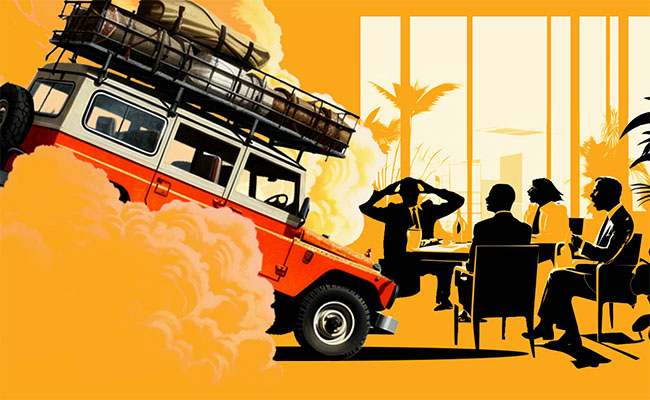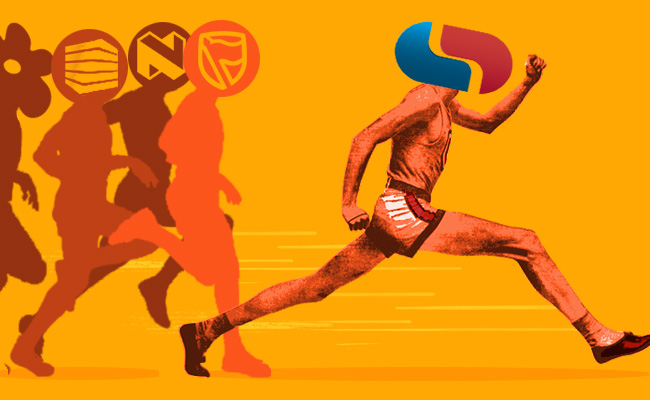Overlanding, for me, is the ultimate adventure. It combines the freedom of road-tripping with the thrill of exploring remote and rugged locations.
But it’s not just about the destination – it’s about the journey. It’s an opportunity to test your endurance, resourcefulness, and resilience, push your limits, explore challenging landscapes, and immerse yourself in new cultures.
It might not seem intuitive, but the skills needed for overlanding – planning, resilience and adaptability – are pretty much the same needed to build a successful business. Unforeseen problems and unexpected opportunities lurk around every corner. And to survive, you need your wits about you.
In business, this can take the form of new technology, sudden shifts in consumer preferences, and changes in market conditions. And entrepreneurs, like overlanders, have to manage their resources carefully: in the wild, it is fuel, water, food and supplies; in the boardroom, it is limited budgets, small teams, or limited access to capital.
There are also breakdowns, which have to be repaired on the fly. For entrepreneurs, these are a loss of funding, a key employee leaving, or a product recall. Outside, you might also run into wild animals; inside the boardroom, it’s the black swan events like a global pandemic that can leave you floundering.
The issue is, how do you deal with all this? The key, I believe, is applying an overlanding mindset to the boardroom. These are the traits I believe are the common denominators.
Awareness: For any overland adventure to be a success, you’ve got to have a strong awareness of what sort of terrain lies ahead. What is your vehicle capable of and what sort of hazards loom, for example. By remaining alert and vigilant, you can navigate difficult terrain with ease. It’s the same with entrepreneurs: by staying alert to market trends, anticipating change, and identifying opportunities, you can make informed decisions and take calculated risks. This keeps you ahead of your competitor.
Preparedness: Planning and gathering essential resources – such as maps, tools, and provisions – is essential. In the boardroom, it is market research, creating a solid financial plan, and allocating resources effectively that leads to success. But this isn’t just about being ready for potential challenges; it is also about being able to take advantage of opportunities. Here, being proactive is vital.
Willingness: Overlanding requires a willingness to embrace uncertainty and adapt to new situations. And it’s the same with business: when the weather changes, entrepreneurs must adjust their strategy. This is what separates successful businesses from those that fail.
Never underestimate a hippo
I’ve had my fair share of close encounters with animals in the African bush. As a result, a valuable rule I now live by is to never underestimate the power of the mighty hippo.
These colossal creatures have claimed more human lives in Africa than the Big Five combined. With a furious temperament, and one of the fastest accelerators in the world – reaching speeds of up to 30km/h – they will snuff your lights out in an instant. They want to kill you, all the time, every time – no exceptions.
Several years ago, I took my then 22-year-old son Ryan tiger fishing in Zambia. We stayed at a place called Jack’s Tiger Fishing Lodge.
It was like something out of the 1800s – affluent men who had amassed their fortunes smoking cigars while relaxing in oxblood leather chairs, while delicate porcelain teacups graced the hands of elegant ladies who sought respite from the heat under the cool breeze of swaying palm fronds. I half expected a figure donning a pith helmet to stride in, extend his hand, and say, “Livingstone, I presume?”
We were up at the crack of dawn every morning. We spent half the day on the water, returning briefly for lunch, only to head back out again until evening approached, when we made our way back to the lodge for a relaxing braai.
Out on the river, there were pods of hippos everywhere, so we made sure to maintain a respectful distance. But to give Ryan a taste of a hippo’s aggressive nature, I asked our skipper to approach one of the pods at a 45-degree angle, then quickly veer away and accelerate the hell out of there. I knew that as long as we approached the pod at an angle and not head on, we’d make the turn.
In every pod, there is always a large alpha male who, when he hears you coming, disappears under the water and heads towards the source of the noise. As he moves, he pushes the water forward with his powerful shoulders, forming a bow wave guaranteed to make the hearts of even the bravest adventurers skip a beat.
But still, the power, aggression, and pure evil intent with which that alpha male charged us that day was terrifying. It left us all trembling and sent a message that Ryan got loud and clear.
The only thing that can go wrong in a situation like that is if your outboard motor stutters and dies, because then you’re toast. In that critical moment, your survival depends on one thing: outswimming your fellow passengers.
Necessary skills
Whether exploring remote landscapes or running a business, resilience, adaptability, and critical thinking are vital. For some people, this comes naturally. For others, the good news is that these skills can be developed. So what is it you need?
Resilience
Resilience, the capacity to recover from setbacks and continue, is vital for overlanders and entrepreneurs. Let’s say you’re in a remote area, and you encounter a washed-out road or mud bog, and your vehicle gets stuck. If you don’t have tow straps, you might try and create traction by using sand mats or tree branches to create a stable surface for the vehicle’s tyres. However you do it, once you’re out of there, you’ll have a newfound appreciation for your own ability to cope with unexpected challenges.
In business, such setbacks are inevitable. For example, if your product launch fails to gain traction, you might use the feedback to improve that product and try again. Or you might seek new marketing channels or partnerships.
To cultivate resilience, entrepreneurs must adopt a growth mindset, seeing setbacks as opportunities for learning and growth, rather than as failures. It’s a necessary attitude: focus on the things you can control, such as your attitude and actions, rather than external factors.
Adaptability
Adaptability is as crucial for entrepreneurs as it is for overlanders. It’s the ability to adjust your tactics and stay focused on your goals, even when the path is uncertain. It’s the same in business: if a new competitor enters your market, you might adjust your pricing or marketing strategy to maintain your edge, for example.
To cultivate adaptability, entrepreneurs must be open minded, constantly scanning the market for new trends and opportunities. They must remain willing to pivot their business, take calculated risks and test ideas, even though some will fail.
Critical thinking
An entrepreneurial spirit and an adventurous mindset go hand in hand. But taking risks doesn’t mean being reckless: entrepreneurs must balance their adventurous nature with sound judgment and informed decision-making, weighing potential rewards against the possible downside.
Problem-solving skills are essential to critical thinking. Being able to think on your feet and come up with creative solutions is crucial to staying on course. This helps you identify the root cause of a problem, brainstorm possible solutions, and choose the best approach. It requires the ability to analyse data, anticipate potential risks, work collaboratively, and communicate effectively.
It’s a skill that will help you identify opportunities that may not be immediately apparent, creating innovative solutions that set you apart from the competition.
Overlanding Through the Boardroom: Using Adventure Principles for Success in Business is published by Rockhopper Books.
Top image: Rawpixel/Currency collages.
Sign up to Currency’s weekly newsletters to receive your own bulletin of weekday news and weekend treats. Register here.














